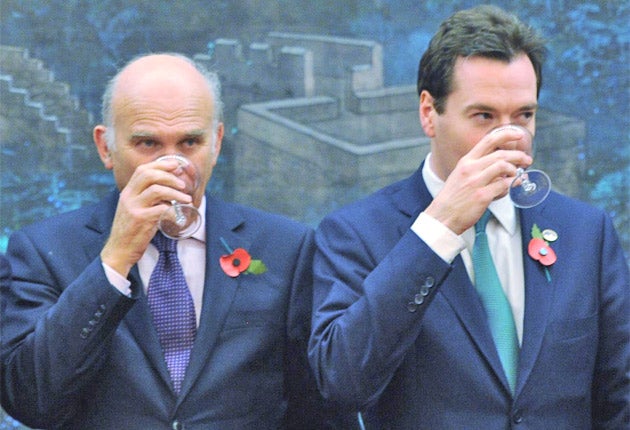Humiliation for 'Saint Vince' as he loses his halo

There were a lot of things Vince Cable could have got away with, but bragging that he had declared war on Rupert Murdoch was not one of them. That is not because Mr Murdoch is the country's biggest media baron, but because Mr Cable was supposed to be representing the national interest as the arbiter of Mr Murdoch's formal bid to be the sole owner of BSkyB.
He should not have been talking about this to anyone outside his private office, let alone a couple of people he did not know, who happened to be undercover reporters from The Daily Telegraph. He almost got away with it when the newspaper decided to withhold his explosive comments and simply report his remarks about the tensions within the Coalition Government and his boast that he had the "nuclear option" of resigning and bringing down the Government.
The comments that the newspaper reported were no worse than embarrassing to Mr Cable and to Nick Clegg, who said of them merely that Mr Cable "is embarrassed by what has happened and he is right to be embarrassed".
The instant reaction from within the Liberal Democrat party was mostly favourable to Mr Cable. They liked the reassurance he was fighting within the corridors of power to bring Government policy closer to Lib Dem beliefs. Mr Clegg went on to praise his overall record as a minister – unaware of the storm that was about to burst as Mr Cable's blundering comments about Mr Murdoch and the BSkyB bid became public knowledge.
Mr Cable has spent eight unhappy months in Government. He had more to lose than any other Lib Dem politician by accepting a place in the Coalition Government because he was the one with the highest reputation.
Until May, he was perhaps the most popular in the Commons. He was "Saint Vince", who saw the banking crisis coming, who could cut through the bankers' excuses, who was witty and self-deprecating, and whose love of ballroom dancing showed a human side. When the Lib Dems were left leaderless by the resignation of Menzies Campbell, Mr Cable held the party together.
But once in Government, it fell to him as Business Secretary to implement the tripling of university tuition fees, a policy he and his party had opposed up until the election. During the run-up to the main vote, there was an interlude in which it was being suggested that Mr Cable might abstain on his own department's legislation.
And from the day he took office, he was compelled to accept that he would not be the one deciding how to handle the banks. That prerogative belongs to George Osborne, who does not share Mr Cable's ideas about breaking up the big banks and forcing them to lend to small businesses.
All that remains of the fierce retribution which Mr Cable once called down upon the heads of overpaid bankers is some disapproving noises from Whitehall, as the banks prepare to shower bonuses on senior staff. A meeting with the banks was called off on Monday because the weather meant that Mr Osborne could not be there, and Mr Cable was not entrusted to go ahead without him.
On Christmas Day, the nation will be able to watch Mr Cable glide across their television screens in a special edition of Strictly Come Dancing. But there is a question over whether it is advisable for someone hoping to be taken seriously as a major figure to expose himself to possible ridicule in this way.
Others have turned down an invitation for that very reason. The former Downing Street communications chief Alastair Campbell claimed on his blog yesterday that he has been invited on to the show "several" times, "but there is a little word called 'credibility' eating away at the back of my mind whenever I get these invites". For Vince Cable, that planned Christmas turn around the dance floor looks increasingly like the last waltz.
Was the sting fair?
MPs usually hold weekly surgeries so that constituents can get things off their chest. But at Vince Cable's surgery the roles were reversed and it was the minister who offloaded.That he chose to do so to two undercover reporters raises ethical concerns about entrapment and privacy. Mr Cable should know that there is no injunction restraining a resident from making public what an MP has told them. It is the Press Complaints Commission which restricts the justification for undercover journalism. Under its code of conduct, reporters who use "misrepresentation or subterfuge" must be able to say it is in the public interest. Mr Cable's comments appear to reveal extreme prejudice in his decision over the legality of Rupert Murdoch's bid to take a majority share in BSkyB. Surely this is fairly and squarely in the public interest.
Robert Verkaik, Law Editor
Subscribe to Independent Premium to bookmark this article
Want to bookmark your favourite articles and stories to read or reference later? Start your Independent Premium subscription today.

Join our commenting forum
Join thought-provoking conversations, follow other Independent readers and see their replies